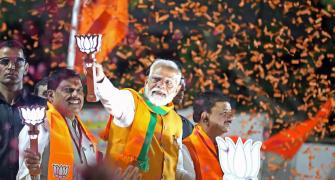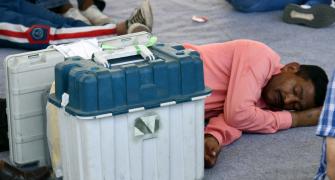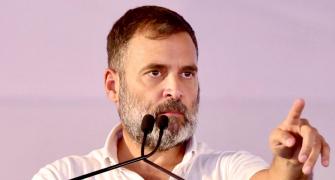He is been seen as the country's ultimate consensus builder. The politician of the moment and some call him now Mr N-deal. Joining us now the External Affairs Minister Pranab Mukherjee. You were smiling when I said Mr N-deal. But that's what the world is seeing you as. Ever since India got the nuclear waiver at the NSG, you are been seen as the real hero of that nuclear waiver.
I don't know whether it is correct, but I can tell you that what helped me is the strong commitment made by Prime Minister Manmohan Singh and US President George Bush in their joint declaration of July 18, 2005.
But sir there is a feeling that it was your statement that you made on September 5: 'We remain committed to a voluntary and unilateral moratorium on nuclear testing.' That statement even as the NSG countries were debating was seen as the clincher. Was that the clincher? Was that a carefully, deliberate move on your part?
Of course, the decision to issue that statement was because when the NSG members were debating and some countries expressed their concerns about the non-proliferation commitment of India, then I thought it necessary to reiterate our commitment.
It wasn't out of a sense of nervousness? It wasn't that Pranab Mukherjee was nervous that the NSG wasn't going to grant the waiver. Countries like Austria, Ireland, New Zealand were objecting and therefore you needed to do that. I am told you were ringing the phones till 5 am in the morning on Saturday.
No, No! It is not a question of nervousness. But what I thought that surely we should not be doubted about our commitment to non-proliferation. The country should not be questioned about what we have stated on a number of occasions. Therefore, if somebody raises an accusing finger that you are not sincere, then we shall have to speak clearly and loudly, 'No we are sincere, we are committed'.
You say you were sincere, you were committed, but then we found suddenly during the weekend that China raising questions whether India should be granted a NSG waiver. Do you feel betrayed? You feel in some way that perhaps China let you down? Be honest about it.
Sincerely and honestly, I want to believe the commitment which was made by the Chinese foreign minister yesterday.
He said that China played a constructive role.
Apart from that what he said facts speak louder than words. He said that they stood with the consensus arrived at the NSG. He committed to us when I had a telephonic conversation with him and on several occasions they told us that they would play a constructive role.
And are you satisfied? Are you willing to give them the benefit of doubt because National Security Advisor M K Narayanan said, 'I must say that we are a little disappointed because at the very highest level Chinese President Hu Jintao and Prime Minister Wen Jiabao had told Manmohan Singh that China would not be a problem.
Taste of the pudding is in the eating. In the final analysis, the waiver was granted by all 45 members of the NSG through consensus including the People's Republic of China.
Why are you so keen to give China the benefit of doubt? The People's Daily wrote on September 1: 'Whether it is motivated by geopolitical consideration or commercial interest, the US-India nuclear agreement has constituted a major blow to the international non-proliferation regime.' And yet you are saying you would like to believe that China played a constructive role.
What happened I am just explaining to you. What the Chinese foreign minister told me during his visit I am trying to explain to you. He told not only me, but he told in my presence on camera the words that I have just spoken. Therefore, let us leave it.
You want to live with it? So did you send a tough message to the Chinese as some believe you did or did you simply reiterate your concerns and are you fully satisfied?
Whatever was necessary to convey to him, I did exactly that, but I do not describe my conversations with the adjective which you are (using) whether it is tough, whether it is soft.
You still believe that the Sino-India relationship can go ahead as a strong relationship?
What exactly was to be stated, what correct postures were to be made, I did exactly that. I can inform you that before the discussion in presence of others, we had a one to one meeting for about half an hour.
How do you describe that? Satisfactory, cordial, warm?
I am again repeating what I just spoke. Whatever message, whatever was to be told I exactly did that.
You don't want to publically concede that you sent out a strong message. Okay, we will concede that point. You have cleared the nuclear waiver hurdle and the next hurdle now is passing it through the US Congress. Mr Mukherjee, how optimistic are you that the deal will go through by the end of September because there is a 30-day session period required to present a pact of this kind. Do you believe that it is possible to get an exception to push it in September?
To implement the 123 Agreement between India and the USA we require the ratification of the 123 Agreement by the US Congress. How it would be possible to a considerable extent it depends on the approach of the US Congressmen and the internal working mechanism between the administration and the Congress.
Are you confident that when Prime Minister Manmohan Singh goes to Washington in end September that we will have an agreement in place? Is that your hope?
I hope that we will get the ratification by the US Congress on the 123 Agreement as early as possible.
As early as possible means September end or are you looking at a lame duck session in December?
No, I do not know. That is (the) internal working mechanism of the US Congress and administration. There are precedents where they have different procedures, there are systems. There are well established mechanisms and every country has its own way of functioning and its own mechanism, particularly in the US administration which is the oldest democracy they have built up these mechanism over a period of time.
Sir, can I get two clarifications, assurances from you? One, wait for the approval of 123 Agreement in the US Congress before you enter into an agreement with other nuclear supplier countries like France and Russia. There is some confusion on that. Let's get a clarification. Will you wait for the 123 Agreement to be cleared?
I am giving you a clarification in very clear and unmistakable terms. The 123 Agreement between India and the USA cannot be implemented unless that agreement which has been initiated by India and the USA is ratified by the US Congress. It cannot be implemented so that part is quite clear. So far the arrangements with other countries where there is no such procedure, where there is no such legal predicament, it can be done but it depends on the talks between other supplier groups.
So you still hope we can do an agreement with France when the prime minister is there at the end of September? With Russia?
I cannot give you the time frame.
Legally, you have no barrier?
Because in those countries there is no such legal system, which is prevalent in the USA.
Ok, fair enough. The other assurance that I want from you and it's the most contentious one. Does India's right to test remain unaffected or not. Does that deal waiver prohibit you in any way from carrying out further nuclear tests? It is a contentious issue. Can you give us where exactly you
I am exactly standing where we stood before this waiver was given, where we stood two years back, where we stood in May 1998 when a unilateral moratorium was declared by the Vajpayee government. Therefore, nothing has been done so far as the waiver by the NSG is concerned which has altered the situation.
So essentially you say we retain the right to test?
We have not altered the situation which prevailed before the waiver was granted to us. But we shall have to keep in mind the situation which was not earlier. Every country is a sovereign country and every country is to go by its own laws. Therefore, if we have the right to take a particular course of action, the other sovereign countries have the right to react and respond in a particular way which they feel necessary. Therefore, I have the right to act; others have the right to react.
So you retain your sovereign right to test, other countries then retain their sovereign right to impose sanctions that will come as a result of your tests.
If they want to have as it happened in 1974, as it happened after 1998.
So you are essentially saying the right to test and the entire controversy over that is a storm in a tea cup?
Of course.
It's a storm in a tea cup?
Because we have not diluted the situation, not one millimetre which prevailed before the waiver was granted and it has not altered after the waiver has been granted. It remains the same as it was earlier.
You have convinced the world, you have convinced 45 nations to come on board, grant us this nuclear a waiver, but you have not been able to convince our Opposition parties the Left, the BJP. The consensus builder in Pranab Mukherjee has failed domestically whereas succeeded internationally.
Perhaps, it is more difficult to build up consensus amongst the political parties who are operating in the country. But apart from that we tried to build up the consensus and it is not correct that we have not been able to build up a consensus.
You say you tried to build up consensus, but your critics L K Advani and others are suggesting that you never really reached out to them. You didn't reach out to the BJP, didn't reach out to the Left. In a sense it became a Congress or a UPA deal, not a national deal.
I am afraid that I do not really understand what the BJP wants to achieve. It is they who declared a unilateral moratorium. I was not in the government in 1998. It is they who conducted the test.
You in a sense are carrying forward the Vajpayee legacy?
It is nobody's legacy. If Vajpayee had carried my legacy; it is a continuing process and today if simply sitting in the Opposition they change their own views, they change their own attitude, I will simply request them to read their commitment that they made in the UN General Assembly, that they made in Parliament.
So far as the Left is concerned, they were ideologically opposed to having any truck with the USA. They told us you do it with France, which cannot be done unless I have the NSG waiver, I cannot enter into a civil nuclear agreement with any other country.
One problem is ideological and one is possibly opposing for the sake of opposing. But they are saying that you have not told the full truth to Parliament. This is where the secret letter comes. The letter that was leaked just before the NSG meeting from the Bush administration to (US) Congressman (Howard) Berman suggesting that the moment we tested fuel supply would be cut off. They say why didn't you come to Parliament and tell us about this. You said in Parliament that fuel supply would be uninterrupted.
First of all, I am still reiterating fuel supply will remain uninterrupted because what transpires between the US Congress and their legislative wing, I am not privy to that. This I am making quite clear.
You are giving a categorical assurance of uninterrupted fuel supply.
Let me complete. The Ministry of External Affairs was not in the knowledge of what transpired between the US executive wing and the US legislative wing. It is their internal matter and most probably those who are criticising it should know that when I send some reply to the questionnaires of Parliamentary Standing Committees, I do not publicise it and tell the whole world and they are not privy to it. It is the internal mechanism.
But so far as the questions are concerned we are not concerned with that as what is transpiring, what they are saying. What we are concerned is the published document. (The) Published document is the joint statement of July 18, 2005, March 2006, 123 Agreement, India specific Safeguards Agreement and now NSG. I would like to request these gentlemen to point out from these published documents where the doubts about the so-called questions they are raising now.
So is that your tough message to Prakash Karat and L K Advani in a sense that please go by published documents. Don't go by leaked letters. That you are giving a guarantee of uninterrupted fuel supply, that the right to remains a sovereign right. Is that what you are trying to tell them and that you have not hidden anything from them?
The message is quite clear. Nothing has been hidden. I can hide something from them if I know it. If I don't know, how can I hide it? No question of hiding. Therefore, that is an absolutely irresponsible observation. (The) Problem with (the) BJP is they believe the under secretary of an administration, but they do not believe their own minister.
So will you take it up with the US administration the manner in which it was leaked?
No, I am not going to take it up with anybody. But if they do not have this minimum self-respect, I can only feel sympathy for them. I was quoting President Bush about the Hyde Act, (the) Leader of (the)Opposition was quoting the under secretary of the US administration. What can I do?
Let me therefore turn around and set back and ask you at the end. We started you by calling you a consensus builder, by calling you in a sense Mr N-deal. Is this the biggest achievement of what has been 40, 50 years in public life? You see this as the most important achievement if the deal goes through?
I cannot evaluate my achievements. Please Rajdeep excuse me.
I will excuse you. You are a unique person. You have been external affairs Minister, you have been finance minister, you have been defence minister. Can I ask you are there any ambitions left in public life? Would you like to be prime minister one day?
I may like and here I must quote my friend (Railways Minister) Lalu (Prasad Yadav). Many people want to be the prime minister, but the question is who is going to make him or her the prime minister. (The) Answer lies there.
Let me ask you one last question. Is this going to be the critical election issue come general elections?
It is an important part of having an alternate source of energy. Bijli sab chaiye. Har aadmi ko chaiye (Everyone needs electricity). Today right now when we are talking 300 million people of India have no access to electricity.
So it will be an election issue?
Of course, every important issue which affects the life of people becomes an issue in the general elections.
Should that be December or should those elections be in April?
I do not know. I am not the political boss. We have a system, we have a process. We shall have to look into it.
At the end of the day, you have had a very long week. Are you feeling relieved, exhilarated or simply tired?
I will just use the first word, a little bit relieved.
Fair enough. I think you have been extremely candid throughout this interview. Thank you very much Mr Pranab Mukherjee, India's Mr N-deal.








